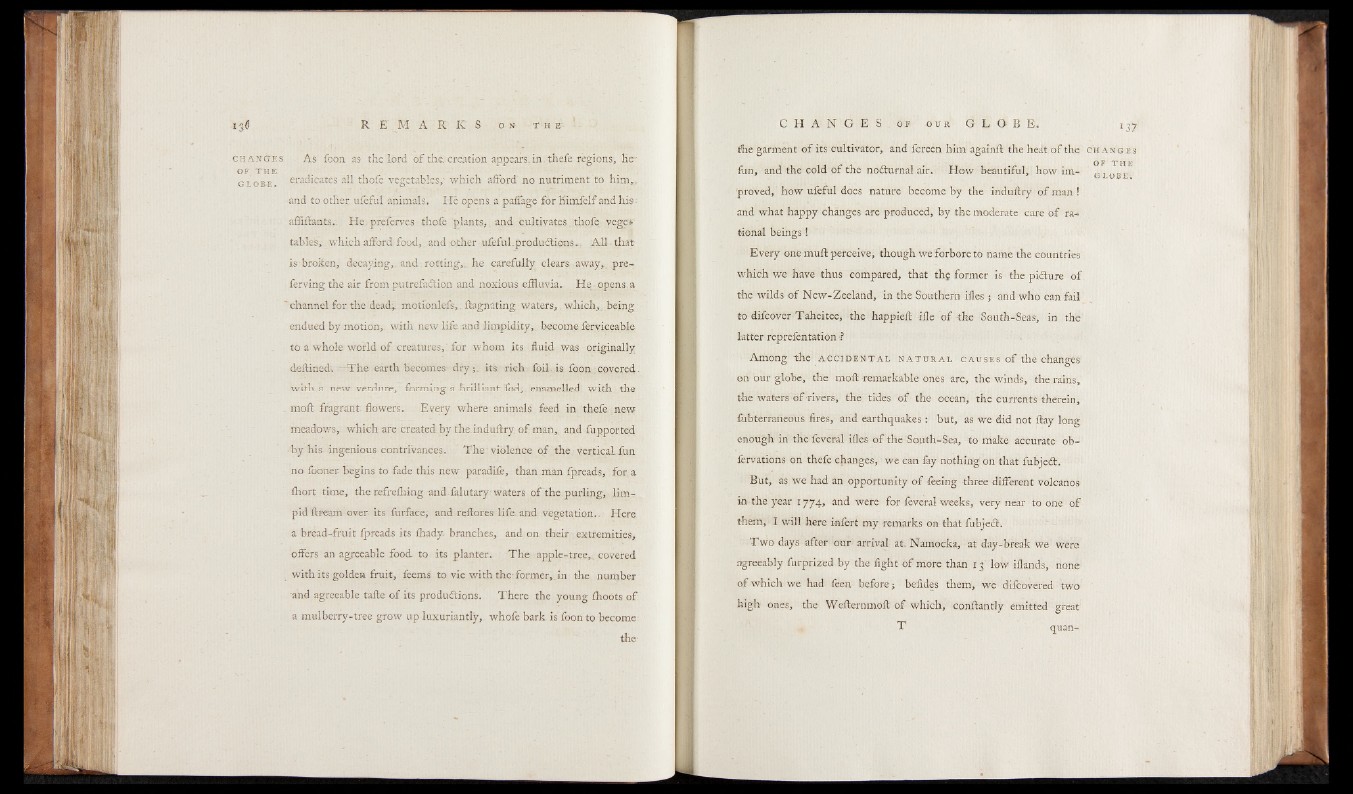
i R E M A R K S o n t h e
c h a n c e s As foon as the lord o f the. creation appears.in. thefe regions, He
OF T H E
G L O B E . eradicates all thofe vegetables,' which afford no nutriment to him,,
and to other ufeful animals. He opens a paflage for Kimfelf and his-;
affiffants.. He.preferves thofe plants, and cultivates, thofe yege-
tables,, which afford food,, and other ufeful.productions., All. that
is' broken, decaying,, and. rotting,, he carefully clears away,, prefer
ving the air from putrefadtion and . noxious effluvia. He opens , a
'channel for, the deadf motionlefs,. flagnating. waters,, which,, being;
endued by motion,, with new life and limpidity,, become ferviceable
to a whole world o f creatures,' for whom its fluid, was originally
deftined. —T h e earth becomes dry.;, its rich foil, is foon covered
with, a new verdure, forming a Brilliant: fod; enamelled with the
. moll fragrant flowers. Every where animals' feed in thefe new
meadows, which are created by the. Induftry. o f man,, and fupported
-by his ingenious contrivances. The'violence o f the, verticaLfim
no fooner begins to fade this new paradife, than man fpreads, for. a
fflort time, the refrefhing and:fidutary waters o f the purling, limpid
ftream over-its furface; and reliores life.and vegetation.. Here
a bread-fruit Ipreads its fhady. branches, and on their extremities.,
offers an agreeable food, to its planter. Th e apple-tree,, covered
with its golden fruit, feems to vie with the-former, in the number
■ and agreeable tafte o f its produdlions. There the young fhoots o f
a mulberry-tree grow up luxuriantly, whofe bark is foon to become.
the-
C H A N G E S o f o u r G L O B E . 1 37
the garment o f its cultivator, and fcreen him again!! the heat o f the
fan, and the cold o f the nodlurnal air. How beautiful, how improved,
how ufeful does nature become by the induftry o f man !
and what happy changes are produced, by the moderate care o f rational
beings!
Every one m ull perceive, though we forbore to name the countries
which we have thus compared, that th j former is the pidlure of
the wilds o f New-Zeeland, in the Southern ides ; and who can fail
to difcover Taheitee, the happiell -ifle o f the South-Seas, in the
latter reprefentation ■?
Among the a c c i d e n t a l n a t u r a l c a u s e s o f the changes
on our globe, the moll -remarkable ones are, the winds, the rains,
the waters o f rivers, the tides o f the ocean, the currents therein,
fobterraneous fires, and earthquakes: but, as we did not flay long
enough in the feveral ifles o f the South-Sea, to make accurate ob-
fervations on thefe changes, we can fay nothing on that fubjedt.
But, as we had an opportunity o f -feeing -three different volcanos
in the year 1774, and were for feveral weeks, very near to one o f
them, I will here inflert my remarks on that fubjedt.
Tw o days after our arrival at. Namocka, at day-break we were
agreeably furprized by the fight o f more than 13 low iflands, none
o f which we had feen before; befides them, we difcovered two
high ones, the Wellernmoft o f which, conftantly emitted great
T
C H A N G E S
OF T H E
G L O B E .
quan